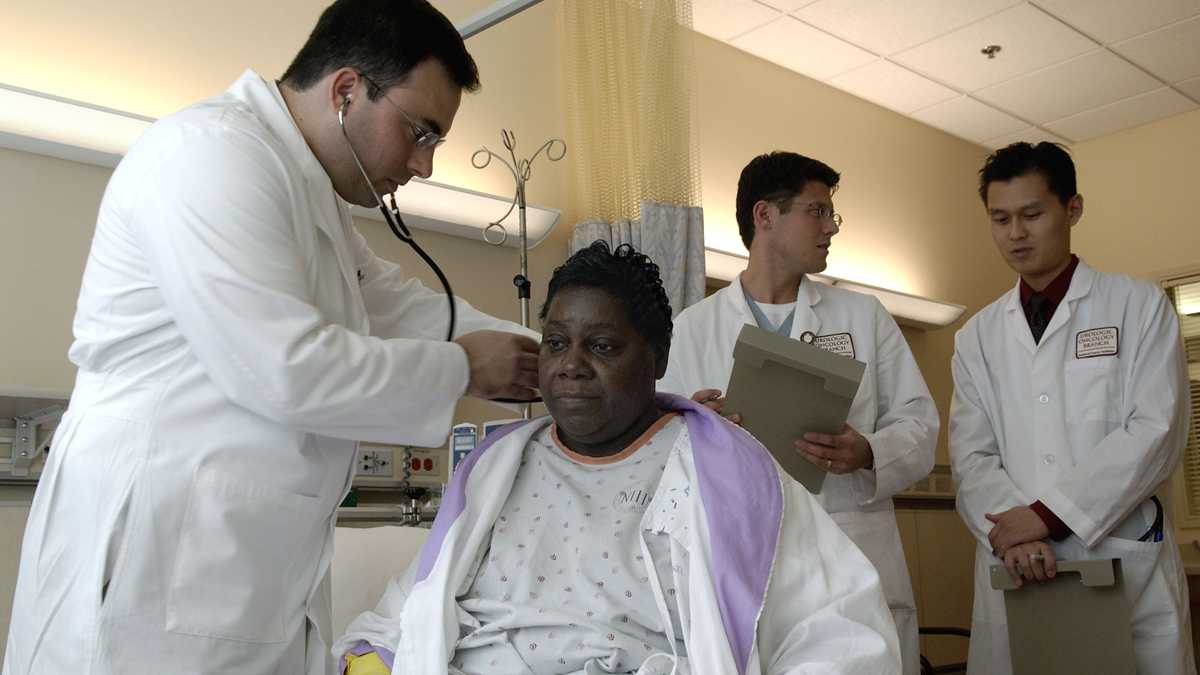In case you missed it: This week’s best reads from Pennsylvania cities

A physician performs a standard physical exam on a patient. (Credit: National Cancer Institute)
Eds, meds, leads and…corruption. (It is Pennsylvania, after all.)
Cure what ails you
The medical sector is growing in Pennsylvania, and it’s not just Keystoners who are checking in. In 2013, about 15 percent of revenue at Children’s Hospital of Philadelphia came from non-regional patients. Five percent of those patients came from abroad, mostly from the Middle East.
But it’s a different picture for those seeking medical care in some communities. A recent study found that in Philadelphia, neighborhoods with large African-American populations are more likely to be in a “low-access area.” That means it’s hard to find a primary care physician when you need one.
Learning from the best?
Pennsylvania could start incorporating best practices from around the globe into local school systems. A new report from the National Council of State Legislatures identified the most important building blocks for strong schools.
A few examples: not letting students start first grade until they are fully prepared, and offering the best teachers and resources to the least well-off students. If that doesn’t sound like Pennsylvania, maybe one day, it could.
On the other hand, the state Auditor General found signs of negligence when investigating how the state manages charter schools. The Department of Education offers lease reimbursements to a number of charter schools that actually own their building, the report found. The department spent nearly $2.5 million on these incorrect reimbursements since 2013.
Building leases are one thing cyber charter schools don’t have to worry about. But there is a revolving door of companies involved with these programs.
Financial mismanagement
Used to be, any lawmaker in Harrisburg could get information about how the pension system would be affected by a tweak to the pension laws. That’s important information, since every lawmaker has constituents affected by pension laws.
Pennsylvania’s state pension system is the second most under-funded in the country, to the tune of $50 billion. What happens if the state defaults on payments? They can’t go bankrupt, since states are sovereign entities. Individual municipalities can, but in Pennsylvania, they often don’t, choosing to enter the state’s Act 47 distressed communities program instead.
Politics as usual?
This week, the perjury trial of Attorney General Kathleen Kane began. Kane entered office as the first Democrat and first woman to hold the elected position, a rising star in the party and the state. She leaves embattled and disbarred. The only question remaining: is she guilty of criminal charges?
There are still FBI investigations ongoing in both Reading and Allentown. While Allentown mayor Ed Pawlowski remains in office, Reading mayor Vaughn Spencer was ousted this year. His successor, Wally Scott, took a different approach, apparently requesting that the FBI visit City Hall this week to receive information he’d discovered.
The information centers on a contract with a towing company in another county. The city of Reading has had a hard time towing cars since the investigation began.
In Philadelphia, the FBI is investigating labor leader John Dougherty, known as Johnny Doc. Dougherty is the head of the International Brotherhood of Electrical Workers Local 98, one of the biggest political spenders in the city. The FBI also paid a visit to the city council office of Bobby Henon, the former political director for the union.
Leaders in lead?
Philly is testing for lead at 40 schools. Pittsburgh is working to find lead pipes — so they can kindly ask residents to remove them. There was a flurry of legislative activity in Harrisburg around remediating the lead hazard in homes.
Is Pennsylvania getting serious about lead? As we’ve reported, it’s a widespread problem that’s difficult to oust completely. But there are some positive examples from around the country. Both Ohio and New Jersey outspend Pennsylvania when it comes to this health risk. And Madison, WI and Lansing, MI have managed to remove all the lead pipes in town.
On a broader scale, NPR writes about the dangers of lead, and whether regulations protect us. NPR also offers up an app, in English and Spanish, that helps you detect whether lead is present in your home.
WHYY is your source for fact-based, in-depth journalism and information. As a nonprofit organization, we rely on financial support from readers like you. Please give today.


